Works in progress: pt2 (M-P)
Mew, Miranda, Munster, Petterd, Petrovitch, Pierce, Proebsting, Pryor
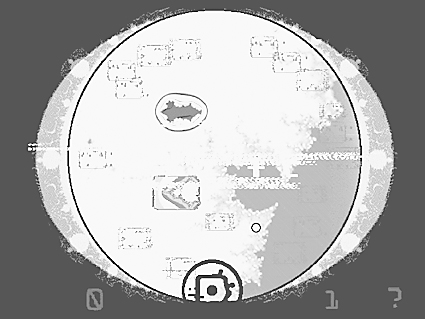
Kathryn Mew, Muto
Muto
Kathryn Mew
Muto is a hyperreal planet, a hybrid of the digital and the organic. Gameplay is highly experimental, using a three dimensional navigation system, textless interface and interactive themes of creation, mutation and destruction. The user is invited to explore Muto’s simulated environments. Red represents corporeal, an environment of breathing, breeding tissue. Green represents earth, a habitat of fertile soil, and flourishing plant life. Blue represents water and the atmosphere. Black represents a world of creation on the smallest of organic molecular levels. White represents an opposing pole of digital reproduction.
Muto, a CD-ROM, began as a post-graduate project (RMIT). The major challenges have been to push the capabilities of the commercially available software (Macromedia Director) to match my vision, and to keep up with new versions of the product as the deadline blows out. Holding down full-time employment and/or freelancing within the multimedia industry during the production process has also been difficult for final completion of the project. Although the work is not yet completed, I have managed to have it exhibited in several national and international multimedia exhibitions (also a lot of work in itself), which helps drive me toward completion.
Kathryn Mew is a Melbourne-based designer. Her main areas of research include interface design, experimental virtual environments and digital culture. Her work ranges from websites to live theatre video support, to CD-ROMs and has appeared in Kabaret Internet in both Munich and Cologne, the Downloading Downunder exhibition in Amsterdam, the Next Wave Festival in Melbourne, dLux Media Arts’ D.art 99 and the ARS Electronica Life Science exhibition Linz, Austria.
Completion December 1999. Australian Film Commission.
Volcano: Shifting Ground
Maria Miranda
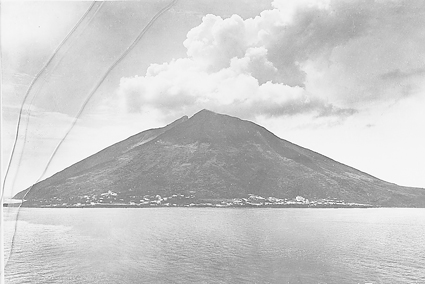
Maria Miranda, Volcano: Shifting Ground
This installation will use the volcano and its shifting ground to explore cultural questions of uprootedness. It will play with notions of surface and depth. Volcano is also a metaphor for the way new media art shifts the ground materially and conceptually. Computers normally map geological activity and volcanism; in Volcano a fissure will be opened up by/in the technology.
One of the artistic challenges will be to find a form of interactivity that poetically expresses a shifting ground, its disruptions and eruptions, rather than following narrative paths. One of the main technical challenges is to explore the different grounds and/or materials of an image through scanning and downloading and to explore the interaction of images and sound.
Maria Miranda is a visual artist working in new media art. She was the visual artist on the award winning CD-ROM Shock in the Ear. She is currently collaborating as visual artist on the new media art installation Dead Centre: the body with organs, and on Dina Panozzo’s performance with interactive media, Monster Mouth.
Completion July 2000. New Media Arts Fund, Australia Council
Wunderkammer
Anna Munster
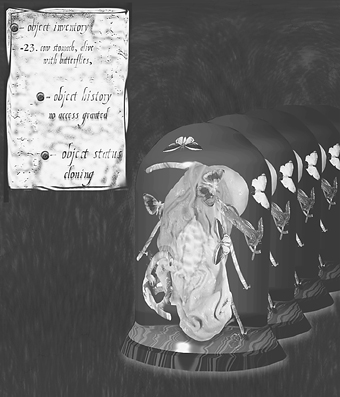
Anna Munster, Wunderkammer
Wunderkammer is an experimental interactive for CD-ROM. Using the visual metaphor of a baroque Cabinet of Wonders, it encourages the user to explore labyrinthine digital spaces and to collect bizarre specimens. These can be used to furnish the user’s own virtual cabinet. While the user wanders and constructs, the specimens take on a life of their own displaying surprising and destabilising behaviours.
Wunderkammer uses both game and behavioural elements programmed in Director and using Quicktime VR interfaces supported by relational databases to inquire into curiosity and wonder. Technical challenges involve the smooth integration of graphics, sound and movie databases into CD-ROM format.
Anna Munster is a digital artist and writer living in Sydney. She has exhibited at Artspace, Australian Centre for Photography in Sydney, Kawasaki City Museum in Tokyo, and most recently at the 1998 Melbourne Festival.
Completion April 2000. Australian Film Commission.
Archiving Imagination
Robin Petterd
Archiving Imagination is an online exploration of the process of collaboration between web authors Robin Petterd (media artist) and Diane Caney (writer). The project incorporates visual and verbal language, utilising and interrogating terms such as intertextuality, interdisciplinarity, net-poetry and the internet.
Documenting the process of collaboration is not a simple task. We have used sound, text and images to record meetings and versions in an attempt to show our thinking processes, but the enmeshing of ideas goes beyond these encounters.
Robin is doing her PhD at the Digital Art Research Facility at the Tasmania School of Art on a project that explores the relationships between what is organisation and dis-organisation. After completing her doctorate in 1997, Diane became intrigued by the medium of html. She began working with Robin in 1997.
www.archiving.com.au Completion August 1999. New Media Arts Fund, Australia Council.
Uncle Bill
Debra Petrovitch
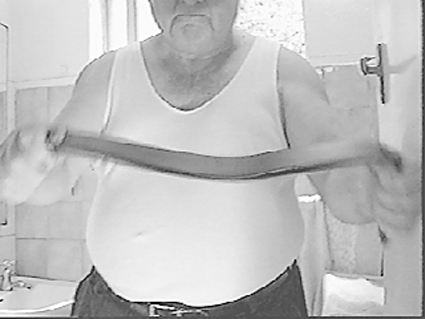
Debra Petrovitch, Uncle Bill
Uncle Bill is an interactive CD-ROM, a semi-autobiographical account of growing up in Wollongong during the 1960s, based on a performance text by Sydney sound artist Debra Petrovitch. It is predominantly a sound and visual artwork set against a harsh industrial backdrop and violent domestic situation. Uncle Bill is aimed to be exhibited within an installation context. A wider audience for Uncle Bill are domestic violence groups and support networks for survivors of child abuse.
Uncle Bill includes text screens, original sound pieces, video, animations and archival footage. Director, Debra Petrovitch; interactive designer, Wade Marynowsky; producer, Julianne Pierce.
Debra Petrovitch is a visual, sound and performance artist who has exhibited widely as well as producing independent soundworks and commissioned film and video soundtracks. Wade Marynowsky is a digital artist currently completing a Master of Fine Arts at College of Fine Art, Sydney. Julianne Pierce is an interactive media artist and producer and part time Project Co-ordinator at The Performance Space, Sydney.
Completion December 1999. Australian Film Commission.
intelligence agency
Julianne Pierce
An online portal, video and performance project currently in development, intelligence agency is an interactive media project, a host site for information corruption and counter-intelligence. The participants are female identities who (under)mine data, capital and IT economy. Currently acting as a research and transmission hub, intelligence agency is a contact point for identities wishing to continue their highly visible activities by remaining totally anonymous.
Julianne Pierce is an interactive media producer, artist and curator, a founding member of the collaborative computer art group VNS Matrix, and has presented work at international exhibitions and conferences including ISEA and Ars Electronica. In 1997, she was a co-ordinator of the 1st Cyberfeminist International (Hybrid Workspace) at Documenta X in Germany. She is currently producing an interactive media project Uncle Bill with sound artist Debra Petrovitch; developing the Digital Artstore distribution project with Jeffrey Cook (3V Media). She is also part-time Project Co-ordinator at The Performance Space, Sydney and is a Board member of the Australian Network for Art and Technology (ANAT) and Artspace.
www.intelligenceagency.org [expired] New Media Arts Fund, Australia Council
Escape from Station E
Irene Proebsting
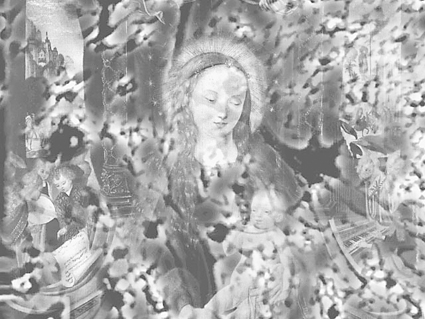
Irene Proebsting, Escape from Station E
An interactive CD-ROM based around the themes of industrial decay, work practices and gender issues, coupled with biological and technological experimentation. I have drawn on various ideas from textbooks, news items, cinema and historical documentation and presented them as an abstract series of events using a variety of stylistic elements from collage to sci-fi movies.
Using Macromedia Director as the main assembly program and incorporating scanned images, collage and 3D, I have created an environment which will enable the user to explore various spaces and activate animations linking different images and themes. Lingo scripting, image manipulation, 3D modelling, sound & video capture, editing & animation have been the challenges of this project.
Recent exhibitions: S8 film screenings: 1999, Ultraprojections 2, Melbourne; 1998, XLR8 Summer Salon, CCP, Melbourne, Traceable Emissions, Queen Vic Women’s Centre, Melbourne; 1997, SURPRISE International Short Film Festival, Taiwan; 1996, Dispersions, Erwin Rado Theatre, Fitzroy; Viva 8, London Filmmakers Co-op, Toynbee Hall, London.
Completion late 1999.
As I May Write
Sally Pryor
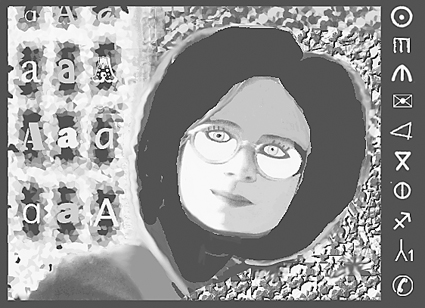
Sally Pryor, As I May Write
As I May Write is an experimental and interactive art-work about writing systems and the human-computer interface. Explores histories (earliest graphemes, “Picture Writing”), contemporary visual languages (Blissymbolics, logos), relevant theories (hypertext, semiotics), and possible applications of “intelligent” icons in an interactive media space.
My biggest challenge is that I make art in order to find out what I think/feel about something. So I can’t do detailed technical and artistic planning before starting. I have to program it, “look” at it, re-program it etc in a spiral process that works for me but makes team work difficult. The medium will probably be a combination of CD-ROM (for the bandwidth) and interactive online (for the connectivity and fluidity).
Sally Pryor is an artist/programmer and independent multimedia developer with an eclectic background including biochemistry and 3D computer animation. Her most recent work was the internationally award-winning CD-ROM Postcard From Tunis.
www.ozemail.com.au/~spryor/write.html [expired] Completion December 2000. New Media Arts Fund Fellowship, Australia Council
RealTime issue #32 Aug-Sept 1999 pg. 5






